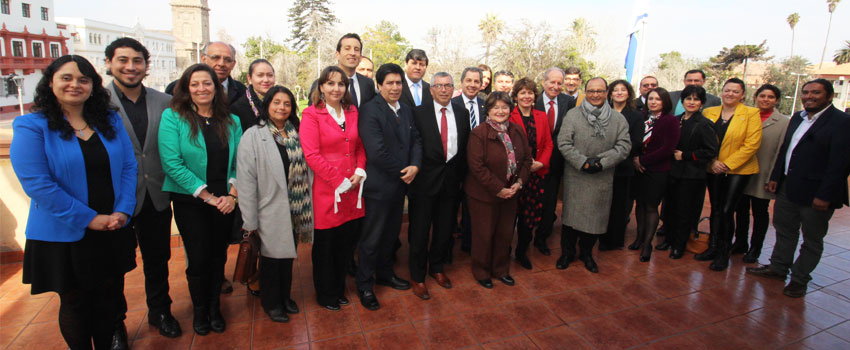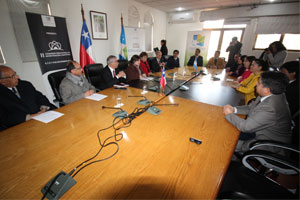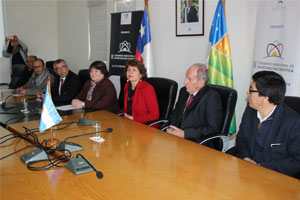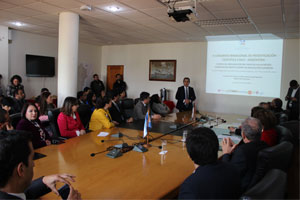- News
Coquimbo Region will host the Second Binational Congress of Scientific Research Chile - Argentina

The congress, which is expected to be attended by 200 people, aims to promote a space for debate, multidisciplinary updating and stimulation of scientific and technological research.
In the Prat Hall of the Regional Administration, the official launch of the Second Binational Congress of Scientific Research Chile - Argentina was held, which will take place in the Coquimbo Region on November 6, 7, 8 and 9 of this year, framed in the Integration Committee of Paso Agua Negra - Commission of Higher Education Institutions.
This congress, supported by the Coquimbo Regional Council, aims to promote a space for debate, multidisciplinary updating and stimulation of scientific and technological research in a wide spectrum of areas of knowledge, promoting exchange and integration between Argentine and Chilean researchers. , thus generating opportunities for academic development related to regional, national and international interests.
 It is also expected to promote dialogue and scientific exchange, which enables the enrichment of research experiences generated by young researchers from the different scientific-academic institutions of Chile and Argentina, in addition to constituting an inspiration to increase vocational interest in study and development. of sciences, as a source of knowledge and development.
It is also expected to promote dialogue and scientific exchange, which enables the enrichment of research experiences generated by young researchers from the different scientific-academic institutions of Chile and Argentina, in addition to constituting an inspiration to increase vocational interest in study and development. of sciences, as a source of knowledge and development.
The meeting is aimed at undergraduate and graduate students from various university and higher education careers, who are developing or have recently completed research activities in their respective homes of study in both Chile and Argentina; and researchers and research professors from universities and Higher Education institutions in both countries. It should be noted that the Higher Education System of the Coquimbo Region reached a total of 2017 undergraduate and graduate students in 43, distributed among the different Universities, Professional Institutes and Technical Training Centers.
A call for close to 200 attendees is expected, from both countries, who will participate in master classes, presentations and posters, the thematic axes being: Binational economic development; Education and culture; Turistic development; Social development; State, society, power and politics; Medicine and health; Present and future energy; and Geoscience, environment and environmental sustainability.
 For the president of the Coquimbo Regional Council, Adriana Peñafiel, it is relevant “to be able to support these initiatives that are academic-scientific in nature and above all because they are within the integration framework of the Paso Agua Negra International Tunnel. And in addition to that, it is the meeting of 200 young researchers, young people who are preparing for an academic life, and the fact that they can come and do this exchange with the different Higher Education institutions and that they can also share with our students, is an opportunity from an educational, cultural and scientific point of view and a sign of the interest of both nations and, above all, both regions, in integration.”
For the president of the Coquimbo Regional Council, Adriana Peñafiel, it is relevant “to be able to support these initiatives that are academic-scientific in nature and above all because they are within the integration framework of the Paso Agua Negra International Tunnel. And in addition to that, it is the meeting of 200 young researchers, young people who are preparing for an academic life, and the fact that they can come and do this exchange with the different Higher Education institutions and that they can also share with our students, is an opportunity from an educational, cultural and scientific point of view and a sign of the interest of both nations and, above all, both regions, in integration.”
Meanwhile, the president of the Commission for the Integration of Higher Education Institutions, Adriana Ledezma, pointed out that this second version of the binational congress considers a “call to all young people and not so young people to participate, to make research proposals in the areas themes defined by this Commission, and the importance has to do, first, with the milestone of uniting the will and generosity of all Higher Education institutions to work with a common objective, in what we do of contributing to knowledge, which has no sense if we do not link ourselves with the environment, with the community, and this is a way of doing it, of putting what we are developing at the service (...). We also hope to achieve this integration with the Province of San Juan and raise important proposals for the region and the country.”
Regarding the congress, the Vice-Rector for Research and Postgraduate Studies of the ULS, Dr. Eduardo Notte, expressed that it is an opportunity for interaction “for the regional institutions and for the Region of Coquimbo and the Province of San Juan. We have many things in common and we believe that it will be a great opportunity for the development of the regions, and how universities act in this. Science has a lot to do with development and that is one of the things we want to highlight in this congress.”
 In this II Binational Scientific Research Congress, the regional organization will be in charge of the Higher Education Commission, belonging to the Paso Agua Negra Integration Committee - made up of the University of La Serena, Universidad Católica del Norte, Universidad Central, Universidad Santo Tomás, Technological University of Chile INACAP, Pedro de Valdivia University, Aconcagua University, Bolivarian University, IPChile Professional Institute of Chile, AIEP Professional Institute and Central Valley Professional Institute -, through the Research and Postgraduate Subcommittees, Linkage with the Environment, Teaching and Communications. In addition, the National University of San Juan and the Catholic University of Cuyo join the organization.
In this II Binational Scientific Research Congress, the regional organization will be in charge of the Higher Education Commission, belonging to the Paso Agua Negra Integration Committee - made up of the University of La Serena, Universidad Católica del Norte, Universidad Central, Universidad Santo Tomás, Technological University of Chile INACAP, Pedro de Valdivia University, Aconcagua University, Bolivarian University, IPChile Professional Institute of Chile, AIEP Professional Institute and Central Valley Professional Institute -, through the Research and Postgraduate Subcommittees, Linkage with the Environment, Teaching and Communications. In addition, the National University of San Juan and the Catholic University of Cuyo join the organization.
The activities of the meeting will take place in the Gabriel González Videla Congress Hall of the Regional Intendancy, in the Gabriela Mistral Regional Library and in facilities of the U. de La Serena, the U. Central, the Universidad Santo Tomás and INACAP.
The I Binational Scientific Research Congress was organized by the UNSJ and the Secretary of State for Science, Technology and Innovation of the Government of the Province of San Juan, through the Directorate of Scientific Promotion and International Cooperation, and the Catholic University of Cuyo . From Chile, at that time, the University of La Serena, Universidad Santo Tomás, Universidad Central and Universidad Católica del Norte collaborated, all of them located in the Coquimbo Region.
